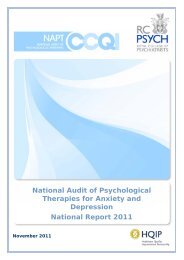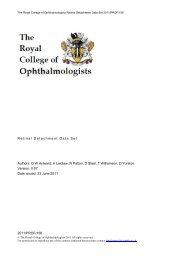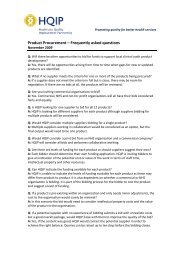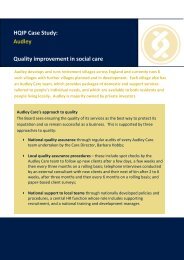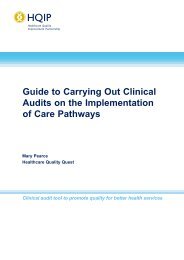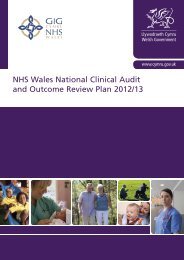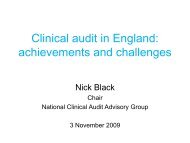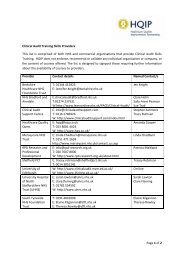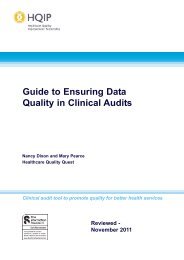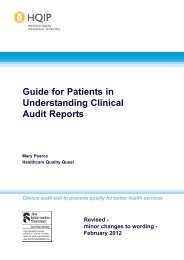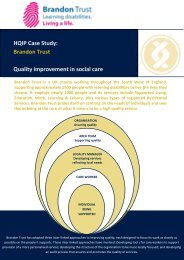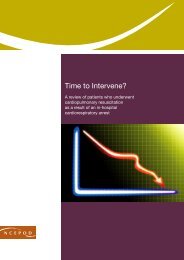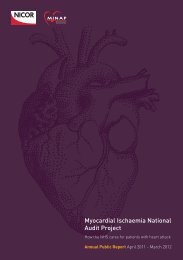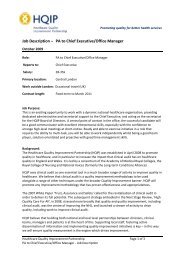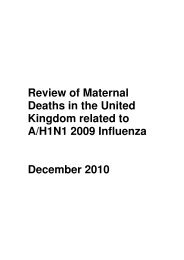Good Governance Handbook - HQIP
Good Governance Handbook - HQIP
Good Governance Handbook - HQIP
Create successful ePaper yourself
Turn your PDF publications into a flip-book with our unique Google optimized e-Paper software.
<strong>Governance</strong> principle 6: Delegation and reservation<br />
Boards will set out how they govern through a system of delegation and reservation.<br />
The board will overtly decide what decisions it reserves (or holds) to itself as a<br />
governance responsibility, and those it will delegate elsewhere. The most significant<br />
delegation is usually to management, but boards may also delegate to sub-groups of<br />
the board itself, to advisors, to partners or through other controlled means. Boards<br />
will describe the limits and substance of all delegations and reservations.<br />
Typical forms of delegation within an organisation, aside that to management, will<br />
include formally agreed delegation to board sub committees. These should be few in<br />
number and not confused with management groups often misleadingly called<br />
‘committees’.<br />
The only required committees are audit and remuneration & appointments, although<br />
many organisations will have a charitable trust committee and mental health service<br />
providers (the ‘Managing Authority’) and commissioners (the Supervisory Body) will<br />
require appropriate structures and assurance for their application of Deprivation of<br />
Liberty Safeguards (DOLS) and review.<br />
Advice over the years has also variously recommended clinical governance/quality,<br />
investment and risk committees.<br />
• Audit committee – a sub-committee of the board comprising non-executive<br />
directors, but not the Chair or Vice Chair, who will assure the board that ALL<br />
the governance systems and processes including clinical are working. The<br />
audit committee will have a special relationship with the internal auditors, and<br />
may invite executive colleagues to attend and participate in meetings. Better<br />
practice (Audit Committee <strong>Handbook</strong>, HFMA 2011) indicates that the audit<br />
committee should have at least one closed meeting each year without<br />
management present in order to provide feedback and discuss candidly the<br />
auditor’s relationships with management and the adequacy of resources<br />
available.<br />
• Remuneration and appointments committee – which will oversee<br />
appointments to the board and all matters relating to remuneration and pay<br />
for board members. It is very important that the remuneration and<br />
appointments committee is able to show proper process to explain why<br />
appointments have been made to the board, and why particular rewards<br />
packages have been agreed.<br />
• Risk/investment committee – which will look at the prospective risk<br />
environment and help the board gauge its appetite for and approach to risk.<br />
This committee is rehearsed in the approach taken to governance by Sir David<br />
Walker’s review of the banks, and the investment committee<br />
recommendations by Monitor. This committee will have a key role in<br />
developing the organisation’s risk appetite.<br />
www.good-governance.org.uk 13



